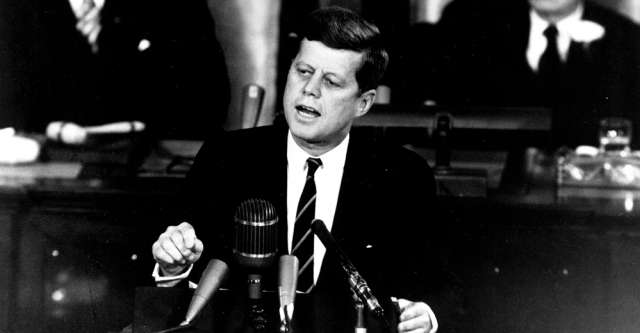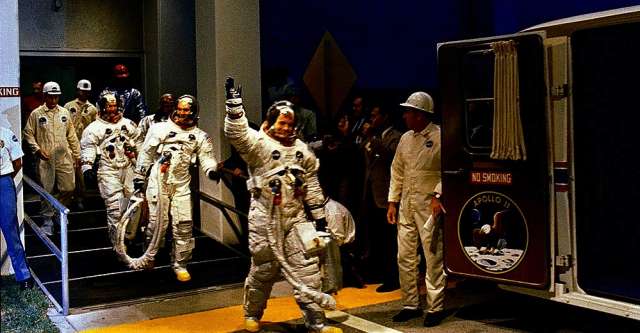The Mercury missions were to see if people could survive in space, the Gemini missions were the testbed for technology that would be used in the Apollo missions later on, but the Apollo missions began with the mission of putting a man on the moon.
Why Did We Go To Space?
During the Soviet advancements in the space race and Yuri Gagarin orbiting the earth. President John F. Kennedy addressed a joint session of Congress on May 25, 1961, where he urged Congress and the American people to help the United States space program.
We choose to go to the moon in this decade and do the other things, not because they are easy, but because they are hard, because that goal will serve to organize and measure the best of our energies and skills, because that challenge is one that we are willing to accept, one we are unwilling to postpone, and one which we intend to win… [1]
His aim was to prove that freedom beats tyranny.
The steps the United States government would take to beat the Soviets in the space race consisted of giving more money to the National Aeronautics and Space Administration (NASA) which according to NASA is responsible for unique scientific and technological achievements in human spaceflight, aeronautics, space science, and space applications that have had widespread impacts on our nation and the world. [2]

Kennedy’s Dream Becomes A Reality
Kennedy’s dream outlived him six years after his assassination, November 22, 1963. On July 20, 1969, the Eagle had landed in the Sea of Tranquility. Kennedy’s dream was fulfilled immediately upon Neil Armstrong stepping on the moon and saying the iconic words “That’s one small step for a man, one giant leap for mankind.” [3]
First, I believe that this nation should commit itself to achieving the goal, before this decade is out, of landing a man on the Moon and returning him safely to the earth. [4]
With America being the only country to put a man on the moon, Neil Armstrong being the first, officially makes the United States the winner of the space race. These actions proved freedom beats tyranny.
What We Got From Space Travel
We have benefited greatly from NASA’s endeavors to explore space while protecting the astronauts some of the inventions that have been released to the public are: Fire-Resistant Reinforcement, Portable Cordless Vacuums, Freeze Drying Technology, Anti-Icing Systems, Temper Foam, and Light-Emitting Diodes (LEDs) just to name a few for the full list and more detail go here.
Notes:
- ^“JFK RICE MOON SPEECH.” 11 July 2008. (go back
)
- ^Wilson, Jim. “NASA History Overview.” NASA, 3 Mar. 2015. (go back
)
- ^Administrator. “July 20, 1969: One Giant Leap For Mankind.” NASA, 19 Feb. 2015. (go back
)
- ^Kettley, Sebastian. “JFK Moon speech: Read President Kennedy’s historic address as Apollo 11 anniversary looms.” Express.co, 26 May. 2019. (go back
)

